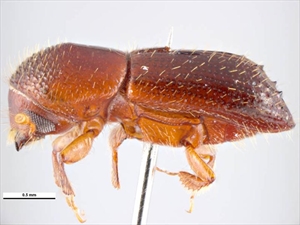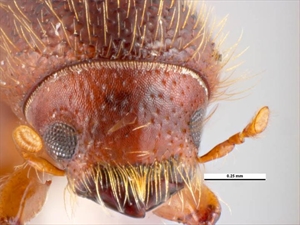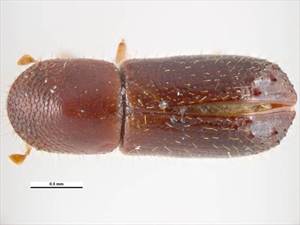- Worldwide distribution. In Australia, New Zealand, most Pacific island countries.
- Major pest causing tunnels and staining in distressed, fallen trees and sawn timber. All stages completed inside tunnels, feeding on fungus introduced by adults as they bore.
- Spread: adults emerge and fly short distances. Longer distance spread with domestic and international movement of logs and timber.
- Biosecurity: high chance of introduction in logs and timber. Countries yet free should set traps at ports, and ensure crates, pallets and dunnage compliant with international standard: (http://www.fao.org/3/a0450e/a0450e.pdf).
- Cultural control: remove felled trees as quickly as possible, and convert to seasoned timber.
- Chemical control: not appropriate; insecticides unlikely to reach the beetles deep inside trees, logs or timber.
Pacific Pests, Pathogens and Weeds - Online edition
Pacific Pests, Pathogens, Weeds & Pesticides
Island pinhole borer (482)
Island pinhole borer. It is also known as ambrosia beetle, bark beetle, coconut shot-hole borer, and shot-hole beetle. The common name, ambrosia beetle, belongs to a number of related species. Ambrosia beetles cultivate fungi as their sole food source in the tunnels they make in distressed trees.
Xyleborus perforans; previously known with other species names, and also placed in other genera, e.g., Anodius, Bostrichus and Tomicus.
AUTHOR Grahame Jackson
Information from CABI (2020) Xyleborus perforans (island pinhole borer) Crop Protection Compendium. (https://www.cabi.org/cpc/datasheet/57169); and from Walker K (2006) Island pinhole borer (Xyleborus perforans). PaDIL - (http://www.padil.gov.au). Phots 1-3 Walker K (2006) Ibid.
Produced with support from the Australian Centre for International Agricultural Research under project HORT/2016/185: Responding to emerging pest and disease threats to horticulture in the Pacific islands, implemented by the University of Queensland and the Secretariat of the Pacific Community.






